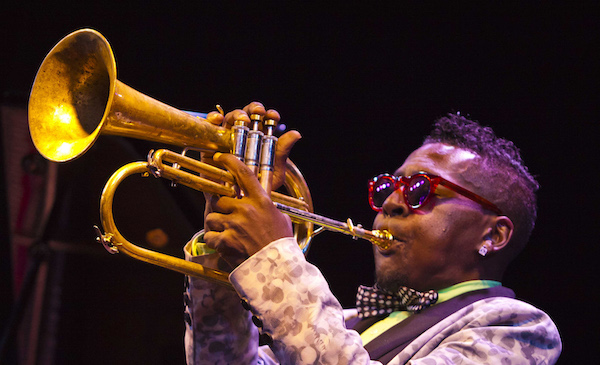Jan 13, 2026 2:09 PM
More Trump-Kennedy Center Cancellations
The fallout from the renaming of the John F. Kennedy Center for the Performing Arts to include President Donald…

Roy Hargrove (1969–2018)
(Photo: R. R. Jones, Courtesy Kuumbwa Jazz Center in Santa Cruz, California)Trumpeter Roy Hargrove died on Nov. 2 in New York City, according to a statement released by his manager, Larry Clothier. The cause was cardiac arrest, related to a longtime fight with kidney disease. He had been hospitalized due to kidney problems. Hargrove was 49.
A versatile jazz musician who was equally at home in the worlds of bebop, Latin jazz, r&b and hip-hop, Hargrove won two Grammy awards.
He won a 2002 Grammy in the category Best Jazz Instrumental Album for Directions In Music: Live At Massey Hall, featuring a band he led with pianist Herbie Hancock and saxophonist Michael Brecker.
He won a 1998 Grammy in the category Best Latin Jazz Performance for Habana, recorded with his band Crisol.
Hargrove topped the category Rising Star–Trumpet in the DownBeat Critics Poll in 1991, 1992 and 1993.
On his 2003 album Hard Groove, recorded with his band The RH Factor, Hargrove blended jazz with r&b and hip-hop, recruiting as collaborators Erykah Badu, Common, D’Angelo, Mark Cary, Karl Denson and others.
Hargrove played on D’Angelo’s iconic 2000 album, Voodoo, and the same year, he contributed to Common’s album Like Water For Chocolate.
Roy Anthony Hargrove was born Oct. 16, 1969, in Waco, Texas. He attended Booker T. Washington High School for the Performing and Visual Arts in Dallas, and later studied at Berklee College of Music in Boston and The New School in New York.
His long list of collaborators includes Shirley Horn, Sonny Rollins, Roy Haynes, Johnny O’Neal, Bobby Watson, Joshua Redman, Branford Marsalis, Macy Gray, Marcus Miller, Carl Allen, Steve Coleman and Antonio Hart.
In a cover story for the March 2006 issue of DownBeat, Hargrove talked to journalist Jennifer Odell about playing music that blended genres: “It’s the same thing I used to see when I was going to Berklee. The jazz guys would be like, ‘The funk cats don’t know tradition, don’t know how to play, don’t know any harmony.’ And then the funk cats would be like, ‘You guys are too heady, never play the groove, play too many notes.’ But there’s a middle ground there, and it’s about understanding a style.
“If you’re gonna play some funk, you gotta know how to bring it in and not play too many notes,” he continued. “You gotta know how to give enough, to lend to the groove that makes people’s feet tap, makes them nod their heads or clap their hands. When you’re playing jazz, you have to have a knowledge of theory and dexterity. It’s a matter of being right in the middle.”
As news of Hargrove’s death spread, many musicians paid tribute to him.
Trumpeter Nicholas Payton wrote, “With every note, this brother dripped soul. In every phrase, he never let you forget you were listening to a Black man playing that horn. He inspires me to no end.”
Bassist Christian McBride wrote, “I have no words over the loss of my dear brother of 31 years. We played on a lot of sessions together, traveled a lot of miles together, laughed a lot together, bickered on occasion—and I wouldn’t change our relationship for anything in the world. Bless you, Roy Hargrove.”
Trumpeter Ambrose Akinmusire wrote, “Roy Hargrove was Truly and always extremely ’BOUT IT. I don’t think I would be alive if I hadn’t met him when I did. I am extremely grateful I got to tell him as a grown man to his face: thank you & I love You.”
Drummer Questlove wrote, “The Great Roy Hargrove. He is literally the one-man horn section I hear in my head when I think about music.”
Trumpeter Theo Croker wrote, “My heart is completely broken. The passing of legend #RoyHargrove is a huge loss to the entire music community. No one single musician has ever represented the scope of Black American music with as much integrity as Roy. Simply put, he was the greatest of all time. REST in POWER.”
Trumpeter Keyon Harold wrote, “The spirit that radiated from the bell of his horn was always a force of youth enthralled with the wisdom of old. … Roy, thank you. You were always the inspiration. You are already missed though you live forever!!!”
Jazz educator Bart Marantz, who taught Hargrove as a teenager, shared his memories of the musician in a DownBeat story posted Nov. 3.
Survivors include his Hargrove’s wife, the singer Aida Brandes; his daughter, Kamala Hargrove; his mother, Jacklyn Hargrove; and his brother, Brian Hargrove. DB

Belá Fleck during an interview with Fredrika Whitfield on CNN.
Jan 13, 2026 2:09 PM
The fallout from the renaming of the John F. Kennedy Center for the Performing Arts to include President Donald…

Peplowski first came to prominence in legacy swing bands, including the final iteration of the Benny Goodman Orchestra, before beginning a solo career in the late 1980s.
Feb 3, 2026 12:10 AM
Ken Peplowski, a clarinetist and tenor saxophonist who straddled the worlds of traditional and modern jazz, died Feb. 2…

The success of Oregon’s first album, 1971’s Music Of Another Present Era, allowed Towner to establish a solo career.
Jan 19, 2026 5:02 PM
Ralph Towner, a guitarist and composer who blended multiple genres, including jazz — and throughout them all remained…

Rico’s Anti-Microbial Instrument Swab
Jan 19, 2026 2:48 PM
With this year’s NAMM Show right around the corner, we can look forward to plenty of new and innovative instruments…

Richie Beirach was particularly renowned for his approach to chromatic harmony, which he used to improvise reharmonizations of originals and standards.
Jan 27, 2026 11:19 AM
Richie Beirach, a pianist and composer who channeled a knowledge of modern classical music into his jazz practice,…